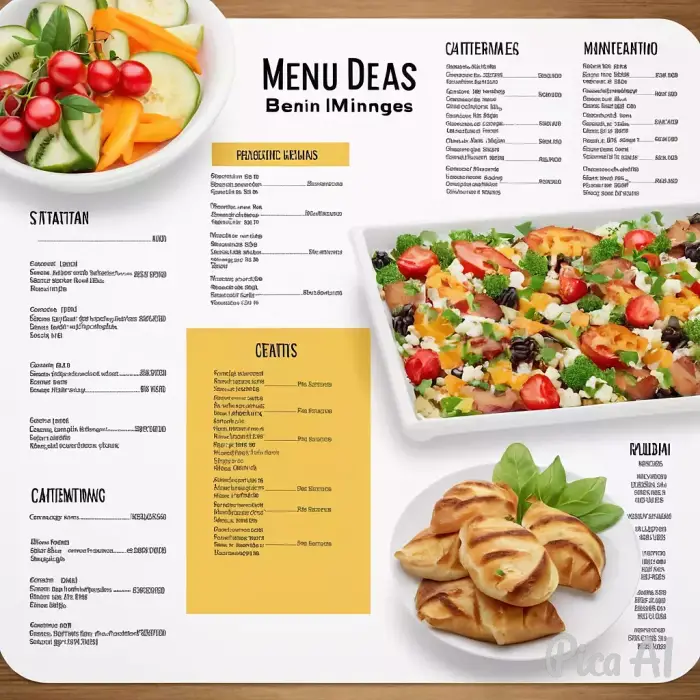
A set-up for catering service.
Catering is an essential service in the hospitality industry, fulfilling the culinary needs of events ranging from weddings to corporate gatherings.
Understanding the local market and identifying opportunities within it can be crucial to establishing and maintaining a successful catering business. Here, we delve into local market insights and uncover potential opportunities for aspiring caterers.
Understanding Local Demographics
Understanding the demographics of your local market is a critical first step for any catering business. Demographics offer insights into the population’s age, income level, cultural background, dietary preferences, and more.
This knowledge allows caterers to tailor their services and menu options to meet the specific needs and preferences of their clientele.
For example, in areas with a high concentration of young professionals, there may be a greater demand for trendy, health-conscious menu items. In contrast, regions with a diverse cultural makeup might benefit from a variety of ethnic cuisines.
Researching local tastes and preferences can enable caterers to create a unique selling proposition that distinguishes them from competitors.
Leveraging Local Ingredients
Sourcing local ingredients is not only a cost-effective strategy but also a marketing advantage. Consumers today are increasingly conscious of where their food comes from and tend to favor businesses that support local agriculture.
Highlighting the use of fresh, locally sourced ingredients can enhance a catering company’s appeal.
Engaging with local farmers and suppliers can also lead to building strong community relationships, which can be mutually beneficial.
Additionally, using seasonal ingredients can further reduce costs while offering clients unique and fresh menu options that change throughout the year.
Identifying Key Market Segments
Catering businesses can benefit from identifying specific market segments that are underserved or growing. Common segments include corporate events, weddings, private parties, and social gatherings.
Each segment has distinct needs and preferences, allowing caterers to specialize or offer tailored packages.
Corporate Events: Corporate clients often seek a reliable, professional service with diverse menu options that can cater to various dietary requirements. Networking with local businesses and offering customizable corporate catering packages can open doors to recurring contracts.
Weddings: Wedding catering is a lucrative segment, though it often demands high attention to detail and customization. Building relationships with wedding planners and venues can lead to more referrals.
Private Events: This segment offers opportunities for intimate and personalized services. Focusing on themes, personalized menus, and exceptional service can result in word-of-mouth referrals.
Social Gatherings: Events like fundraisers, community gatherings, and festivals require flexibility and capacity to handle large numbers. Highlighting experience in managing large-scale events can attract these clients.
Emphasizing Unique Offerings
Standing out in a crowded market requires creativity and innovation. Offering unique services or culinary experiences can attract attention and set a catering business apart. Consider incorporating various elements such as:

Seat and table set-up for guests.
Interactive Food Stations: Create engaging experiences with live cooking stations, DIY food bars, or mixology demonstrations. These interactive elements not only entertain guests but also leave lasting impressions.
Special Dietary Accommodations: With increasing awareness of dietary restrictions and preferences, offering specialized menus for vegan, gluten-free, or allergen-free diets can expand the customer base.
Green Catering Solutions: Emphasizing sustainability by using eco-friendly packaging, reducing food waste, and employing energy-efficient practices can attract environmentally-conscious clients.
Building Strong Referral Networks
Referrals are invaluable in the catering industry. Building strong relationships with event planners, venues, and local businesses can lead to a steady stream of referrals.
Establishing a reputation for reliability, quality, and consistency is essential for gaining the trust of these key network players.
Engage with local event planners and venues to explore partnership opportunities. Offering commission on referrals or creating mutually beneficial agreements can strengthen these relationships.
Networking within the local business community and participating in local events can also increase visibility and foster connections.
Utilizing Digital Marketing
In today’s digital age, an online presence is indispensable. Catering businesses should invest in building a professional website and leveraging social media platforms to reach a broader audience. Key strategies include:
Search Engine Optimization (SEO): Optimize your website with relevant keywords to ensure it appears in local search results. Highlight services, menu options, and unique selling points.
Social Media Marketing: Use platforms such as Instagram, Facebook, and LinkedIn to showcase your culinary creations, share client testimonials, and promote special offers. Engaging content and regular updates can drive engagement and attract potential clients.
Online Reviews and Testimonials: Encourage satisfied clients to leave reviews on platforms like Google My Business, Yelp, and social media. Positive reviews build credibility and can significantly influence potential clients’ decisions.
Adapting to Market Trends
Staying abreast of market trends and being adaptable is key to long-term success in the catering industry. Trends such as plant-based diets, fusion cuisines, and tech-enabled ordering systems are reshaping the culinary landscape.
By keeping an eye on emerging trends and being willing to incorporate them into your offerings, caterers can remain relevant and competitive.
Additionally, the COVID-19 pandemic has accelerated the demand for hygiene-conscious catering solutions, such as individually packaged meals and contactless delivery.
Adapting to these new norms and emphasizing safety measures can reassure clients and potentially open new avenues for business.
Investing in Staff Training
A catering business’s success heavily relies on the quality and professionalism of its staff. Investing in comprehensive training programs ensures that your team is well-versed in customer service, food safety, and event management.
Skilled and knowledgeable staff can enhance the overall client experience, leading to repeat business and positive word-of-mouth.
Conclusion
Understanding and leveraging local market insights can significantly enhance your catering business’s success.
By focusing on local demographics, leveraging local ingredients, identifying key market segments, emphasizing unique offerings, building strong referral networks, utilizing digital marketing, adapting to trends, and investing in staff training, caterers can seize numerous opportunities within their local markets.
Staying informed, adaptable, and client-focused will position your business for sustained growth and success.





